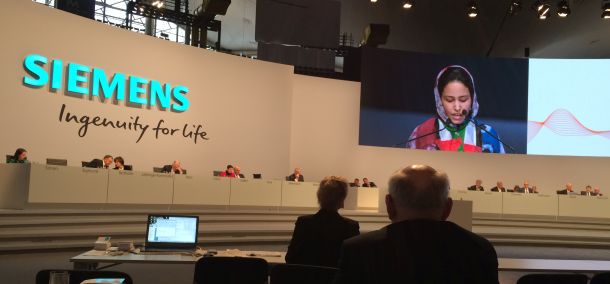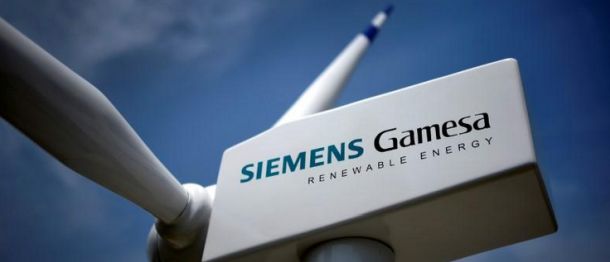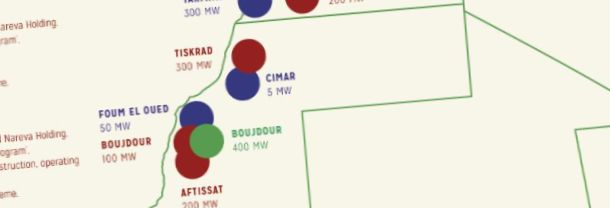
Lors de son assemblée générale annuelle, Siemens Gamesa s'est montré plus évasif que jamais en ce qui concerne les questions fondamentales sur l'implication de l'entreprise dans le Sahara Occidental occupé.
Ci-dessus : Khalil Dambar a perdu son frère Saïd en 2010 sou les coups de fusil d'un policier marocain. Khalil et le reste du peuple sahraoui s'opposent aux projets de Siemens Gamesa au Sahara Occidental occupé. Photo par Equipe Media.
Depuis une décennie maintenant, différentes succursales de Siemens - en particulier Siemens Gamesa Renewable Energy (SGRE) - fournissent, installent et entretiennent des éoliennes au Sahara Occidental occupé. Lors de son AG du 17 mars 2021, la société a de nouveau évité de répondre aux questions liées à ses opérations controversées.
Les accords en question sont dans le portefeuille de Nareva, la société d'énergie éolienne qui appartient au roi du Maroc, qui a une responsabilité personnelle dans l'occupation de la dernière colonie en Afrique. Les deux parcs éoliens opérationnels, Foum el Oued et Aftissat, desservent des utilisateurs industriels, comme Phosboucraa, filiale de la compagnie nationale marocaine OCP, qui exploite illégalement les réserves de phosphate du territoire non autonome. En septembre 2020, SGRE a publié un communiqué de presse sur son obtention du contrat du parc éolien de 300 MW de Boujdour, le localisant « au sud du Maroc ». Boujdour est une ville du Sahara Occidental.
À ce jour, Siemens doit encore clarifier si elle a ou non jamais obtenu le consentement explicite du peuple du Sahara Occidental pour ses activités. Depuis 2016, des arrêts consécutifs de la Cour de justice de l'UE ont statué que le Sahara Occidental est un territoire « séparé et distinct » de tout pays du monde, y compris du Maroc, et que son peuple a droit à l'autodétermination - comme l'a déjà conclu la Cour internationale de Justice en 1975 et répété l’ONU dans plus de 100 résolutions. La CJUE a statué que le peuple du Sahara Occidental a le droit de consentir pour que toute activité commerciale affecte légalement ses terres. La même position a également été exprimée par les organes de traités des Nations Unies lors de l’examen du Maroc au regard du droit international. Le plus grand gestionnaire d'actifs privés de Norvège, Storebrand, a récemment radié Siemens Energy et SGRE pour avoir contribué à des violations du droit international sur le territoire.
En plus de 10 ans, l'évaluation de Siemens sur son implication au Sahara Occidental n'a pas évolué, malgré les critiques croissantes des organisations de la société civile et du peuple détenant le droit souverain sur la terre : les Sahraouis. Le peuple sahraoui a exprimé encore et toujours son opposition aux activités de Siemens au Sahara Occidental. Des manifestants sahraouis se tenaient à l’extérieur de l’AG de SGRE, appelant la société à quitter leur patrie occupée. Un réfugié sahraoui a questionné SGRE directement lors de l'AG. Quelques jours avant l'événement, la société civile sahraouie en Europe avait mené une campagne sur les réseaux sociaux avec le slogan #SiemensGamesaGetOut.
En collaboration avec Dachverband der Kritischen Aktionärinnen und Aktionäre, Western Sahara Resource Watch (WSRW) avait - à nouveau - soumis des questions relatives aux fondements juridiques des opérations de SGRE au Sahara Occidental. Trouvez-les ci-dessous. La réponse de SGRE - encore une fois ne répondant à aucune des questions - figure sous les questions. (Traductions en anglais)
Il est à noter que WSRW avait le 18 février 2021 posé ces mêmes questions par écrit à Siemens Energy, qui détient 67% de Siemens Gamesa. Siemens Energy a répondu le 23 mars dans une lettre signée par son service juridique, que c’est à Siemens Gamesa de répondre à ces questions « car ces activités commerciales au Sahara Occidental relèvent de la responsabilité et de la responsabilité de SGRE ». Jusqu'à présent, SGRE ne l’a jamais fait, non plus lors de sa dernière AG.
QUESTIONS SOUMISES PAR WSRW ET DACHVERBAND KRITISCHER AKTIONÄRINNEN UND AKTIONÄRE À l'A.G. DE SGRE AGM DU 17 MARS 2021
"1. In four consecutive rulings, the European Court of Justice (ECJ) has underlined that Western Sahara and Morocco are two ‘distinct and separate’ territories and that the legal prerequisite for economic activities in Western Sahara is the explicit consent of the Saharawi people.
a) Does SGRE agree with the ECJ, the UN and the International Court of Justice that Western Sahara is a Non-Self-Governing Territory, and not a region of another country?
b) On what legal basis did SGRE conclude that the Boujdour wind farm is to be located in "the South of Morocco", a view expressed in its press release in September 2020?
c) Locating Boujdour in Morocco is a tacit recognition of the Western Sahara as part of the Moroccan territory. Why does SGRE take such a position on international public law?
c) Does SGRE consider it necessary to obtain the consent of the Saharawi people for its activities in Western Sahara?
d) Does SGRE consider holding talks with Moroccan governmental institutions to be a valid means of obtaining the consent of the Saharawi people?
e) ‘SGRE engaged with Saharawi representatives present in the region’, your parent company Siemens Energy stated at its AGM on 10 February 2021. Which Saharawi representatives in the territory has SGRE engaged with? Has SGRE engaged with a single Saharawi who advocates for the Saharawi people’s right to self-determination? If yes, who? What did this person say about your operation on Saharawi land?
2. Siemens Energy stated that SGRE will ‘continue and monitor developments in the field of human rights’ in Western Sahara.
a) What sources, independent from the Moroccan government, will SGRE rely on to do so?
b) How does SGRE assess the credibility of Moroccan official institutions with regard to the situation in the territory that Morocco holds under illegal military occupation?
3. Siemens Energy referred to a legal opinion carried out by SGRE, which supposedly “reaffirmed (...) the compliance of activities in Western Sahara with applicable law”.
a) Will SGRE make this legal opinion publicly available, including sharing it with the people of Western Sahara? If not, why?
b) Can SGRE explain which legal framework is meant with “applicable law”?
c) Who wrote this external legal opinion?
3. The contract for the Boujdour wind farm was signed with the company Narvea, which is owned by the Moroccan king. In this way, SGRE ensures that the king, who is politically responsible for the occupation of Western Sahara, can personally profit from the occupation. Is this anchoring of the occupation, which is contrary to international law, ethically justifiable from your point of view?
4. In November 2020, a group of members of the European Parliament warned Siemens of "serious legal and moral risks" in doing business in Western Sahara. Why did SGRE ignore this warning and why does it continue to pursue these deals?
5. The first consequences of this decision are already becoming apparent: in January 2021, Norway's largest private asset manager, Storebrand, excluded Siemens Gamesa from its portfolio due to concerns over international law for business in the Moroccan-occupied Western Sahara. How high does SGRE assess the risk that other investing companies will follow Storebrand's example?
6. On November 18, 2020, UN-recognized representative of the Saharawi people, the Polisario Front, declared all of Western Sahara a war zone and called on all foreign companies to immediately cease doing business in the occupied territories. Will SGRE heed this call from the people of Western Sahara?
7. Following the withdrawal of Norwegian asset manager Storebrand, will you review your activities and plans in Western Sahara?
8. How do you ensure the safety of your employees who may be affected by the conflict?"
RÉPONSES DE SGRE À L'A.G., 17 MARS 2021
"Please be aware, as a general statement that Siemens Gamesa Renewable Energy, S.A. (hereinafter “SGRE”) refrains, as a matter of policy, from taking positions or making judgements on questions of international law as well as political matters and such remains our position.
Under such premise, we are pleased to provide you with our Company ́s position on the matters you address in the Letter:
1. First of all, and starting from the last point of the Letter, please be assured that health and safety of our employees is of vital essence for SGRE. Having installed our wind turbines in more than 90 countries in the five continents, and within the framework of our strict Security and Health and Safety protocols, we continuously monitor the progress and development in all regions we operate, closely together with our customers and key stakeholders, to ensure that our employees work in safe environments.
In all the regions that we operate in, our internal security protocols include the following recurrent activities:
• Security risks are assessed and periodically updated.
• Security Incidents are monitored and assessed as part of an early alert mechanism.
• Adequate and proportional security measures are implemented according to existing risks.
• Security briefings and instructions are given to our employees.
2. We are aware that the region of Western Sahara is disputed, and that the UN considers the zone as a “non-self-governing territory” since 1963. We at SGRE have neither the mandate nor the capacity to independently advocate on such questions or to issue recognitions under international law or to affirm a territorial status. These matters fall entirely, under the responsibility of governments and institutions, that possess the adequate political capacity, and of other international organizations. We support the position of the international community and the UN, which has consistently called on the parties involved to reach a mutually acceptable political solution.
3. Related to the Ruling by the European Court of Justice, we fully support the statement made back in November 2020 by the European Union ́s High representative for Foreign Affairs and Security Policy, Mr. Josep Borrell, emphasizing its hope for a “fast-return” to UN-supervised talks, which had been suspended since March 2019, and the need for appointment of a new UN envoy for Western Sahara; the envoy position remains vacant since May 2019, after former envoy Mr. Horst Köhler, appointed August 2017, had to step down due to health reasons.
4. We fully respect the decision adopted by Storebrand -Norway's largest private asset manager-, which is relying not only in international law but also on the recommendations of the Norwegian authorities who suggest the private sector to refrain from any agreement - including investments - in Western Sahara.
5. SGRE ́s involvement in projects is limited to delivery, installation, commissioning and service of the wind turbines, being that legal duties related to project development are within the scope of responsibilities of our customers, which own and operate the wind farms according to applicable laws. In addition to this, although human rights treaties do not bind SGRE as a private Company, SGRE has made a voluntary commitment to observe fundamental human rights within the framework of the UN Global Compact.
6. Furthermore, in accordance with our commitment to the UN Guiding Principles of Business and Human Rights and the OECD Guidelines, the external legal assessment updated in February 2020 confirmed, again, the position of SGRE about the compliance of its activities in Western Sahara with applicable laws. Based on our hope for an amicable resolution of controversies, we are continuously monitoring the progress and development in the region closely together with our customers and key stakeholders.
7. In terms of the right of self-determination of people, the installation and servicing of a wind farm under SGRE ́s scope of work does not prevent local population from such right, because the project does not cut them off from access to basic services or institutions, does not destroy or erode the existing infrastructure and does not result in a depletion of natural resources. The capture and use of wind power by the equipment supplied by SGRE is not contrary to the interests of the local population.
8. On the contrary, local population shall benefit from the access to electricity by SGRE ́s contribution to green technologies, considering the vast renewables sources the region is endowed with. The region and its people have a tremendous opportunity to develop fostering investment in renewable energy, and SGRE is bringing and sharing the expertise gained globally throughout the years. SGRE follows its employment policy to hire local workforce first, whenever possible, for its projects. It is not only part time or secondary employment, it also involves both sub-contracting or else internal hiring of local workers full time. For example, during the construction of the Tarfaya wind farm (located just above the western Sahara region), 30% of Saharawi workforce was hired, and for the Aftissat wind farm construction, even 40% of total workforce employed was Saharawi. Recently, in partnership with the NGO’s High Atlas Foundation (HAF) and Santé Sud, SGRE has developed local programs focusing on water access systems, local health, and educational projects. For the access to water project, a canal, drinking towers and pumps were built to provide the main water supply for the Boujdour region ́s nomadic population, enlightened by solar panels. SGRE and HAF also conducted an environmental campaign with 17 schools located in Boujdour, focused on workshops involving 1,000 students on environmental awareness, waste management and tree planting activities. All initiatives are in respect to SDG 3 (Good health and wellbeing), SDG 4 (quality education), SDG 6 (Clean water and sanitation) and SDG 7 (Affordable and clean energy). We also supported the local communities during covid-19 times by distributing food, sanitary products as well as planting 5,000 trees in the region.
9. As it is customary within its scope of work, SGRE engages with local civil society organizations, i.e. Saharawi people representatives present in the region in this case in order to maximize the positive socio-economic outcome of the activities being carried out.
While we remain close to key global institutional stakeholders to foster a prompt amicable resolution of controversies, SGRE remain committed to the development of the region and its people, based on vast renewables resources the land is endowed with."
AG Siemens : toujours pas de réponses sur le Sahara Occidental
Pour la quatrième année consécutive, Siemens la compagnie d'ingénierie allemande ne répond pas lors de son assemblée générale annuelle de son obtention du consentement du peuple du Sahara Occidental pour opérer sur ses terres.
Siemens en AG ne répond pas à la question du Sahara Occidental
Siemens : fournisseur des éoliennes du roi du Maroc au Sahara
WSRW a de nouveau demandé à Siemens de clarifier comment l'entreprise a obtenu l'autorisation du peuple du Sahara Occidental pour son implication dans presque tous les projets d'énergie éolienne du Maroc dans le territoire occupé.
L'énergie éolienne marocaine au Sahara Occidental occupé passerait 40%
D'autres fermes éoliennes sont prévues au Sahara Occidental occupé, et toutes sont dans le portefeuille de la compagnie du monarque marocain NAREVA.



